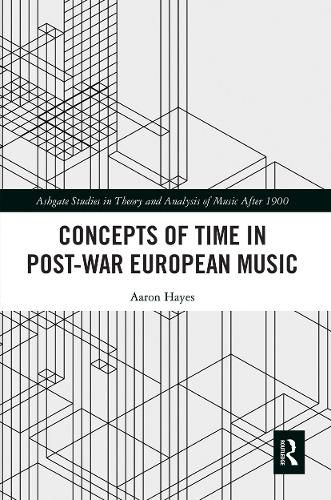Readings Newsletter
Become a Readings Member to make your shopping experience even easier.
Sign in or sign up for free!
You’re not far away from qualifying for FREE standard shipping within Australia
You’ve qualified for FREE standard shipping within Australia
The cart is loading…






Concepts of Time in Post-War European Music gives a historical and philosophical account of the discussions of the nature of time and music during the mid-twentieth century.
The nature of time was a persistent topic among composers in Paris and Darmstadt in the decades after World War II, one which influenced their musical practice and historical relevance. Based on the author’s specialized knowledge of the relevant philosophical discourses, this volume offers a balanced critique of these composers’ attempts at philosophizing about time. Touching on familiar topics such as Adorno’s philosophy of music, the writings of Boulez and Stockhausen, and Messiaen’s theology, this volume uncovers specific relationships among varied intellectual traditions that have not previously been described.
Each chapter provides a philosophical explanation of specific problems that are relevant for interpreting the composer’s own essays or lectures, followed by a musical analysis of a piece of music which illustrates central theoretical concepts.
This is a valuable study for scholars and researchers of music theory, music history, and the philosophy of music.
$9.00 standard shipping within Australia
FREE standard shipping within Australia for orders over $100.00
Express & International shipping calculated at checkout
Concepts of Time in Post-War European Music gives a historical and philosophical account of the discussions of the nature of time and music during the mid-twentieth century.
The nature of time was a persistent topic among composers in Paris and Darmstadt in the decades after World War II, one which influenced their musical practice and historical relevance. Based on the author’s specialized knowledge of the relevant philosophical discourses, this volume offers a balanced critique of these composers’ attempts at philosophizing about time. Touching on familiar topics such as Adorno’s philosophy of music, the writings of Boulez and Stockhausen, and Messiaen’s theology, this volume uncovers specific relationships among varied intellectual traditions that have not previously been described.
Each chapter provides a philosophical explanation of specific problems that are relevant for interpreting the composer’s own essays or lectures, followed by a musical analysis of a piece of music which illustrates central theoretical concepts.
This is a valuable study for scholars and researchers of music theory, music history, and the philosophy of music.